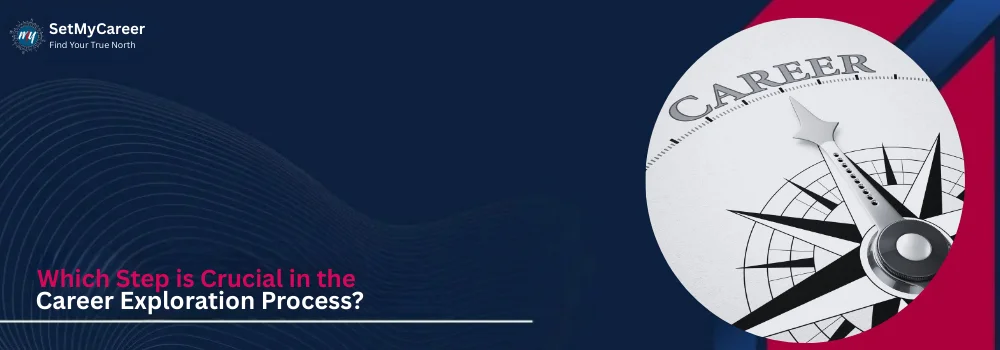
Published by SMC Team on 23 August 2025
SetMyCareer Editorial Team
SetMyCareer Editorial Team brings together expertise in career strategy, industry insights, and content excellence. The team is committed to delivering powerful, research-driven guidance that empowers professionals and students alike. With every blog, they aim to inspire bold career choices and lasting success.
Gain insights and tips to navigate your journey toward a rewarding profession.

There are countless options, career paths, and advice pieces telling you what to do next. But amidst all the noise, there's one step in the career exploration process that stands out as truly crucial and it might not be the one you expect. In this blog, we’ll reveal that key step, explain why it matters, and show how it connects to the importance of career planning, career decision making, and aligning with my career goals. We'll also look at how career management and career planning go hand in hand, and why setting development goals for work can’t be overlooked.
Before we identify the most crucial step, let’s quickly define what career exploration is.
Career exploration is a process of discovering and understanding the careers that align with your interests, values, skills, and goals. It includes researching job roles, industries, educational requirements, salaries, growth opportunities, and more.
But here’s the truth: you can explore all the jobs in the world, and still feel lost unless you start the process the right way.
The most crucial step in the career exploration process is self-assessment.
Why? Because no amount of research or job hunting will help if you don’t first understand who you are and what matters to you.
Self-assessment helps answer key questions like
What am I passionate about?
What am I naturally good at?
What kind of work environment suits me?
What are my career goals?
Without this clarity, your decisions may be based on guesswork, trends, or pressure and not on what will actually fulfill you in the long run.
This brings us directly to the importance of career planning. Once you know yourself better through self-assessment, career planning helps you turn that knowledge into action.
Here’s why planning matters
It gives structure to your ambitions.
It aligns your career path with your personal strengths and values.
It reduces the risk of job-hopping or falling into roles that don’t suit you.
Career planning isn't just for students or fresh graduates it’s valuable at any stage of your career.

Many people confuse career planning and career management, but they serve different (and complementary) purposes.
Career planning is about setting your goals and outlining the steps to achieve them.
Career management is about making adjustments along the way, refining goals, developing new skills, or shifting direction based on experience.
Together, career management and career planning help you build a career that’s both intentional and adaptable. It ensures you're not only moving forward but also moving in the right direction.
When you understand your values, preferences, and capabilities, it becomes easier to define my career goals. These goals act as a guiding light throughout your career journey especially during times of transition or uncertainty.
Examples of career goals could include:
Gaining leadership experience
Working in a creative or mission-driven field
Earning a certain income or certification
Achieving work-life balance
The earlier you set your career goals, the easier it becomes to filter out options that don’t align and focus on opportunities that do.
Once you’ve explored your options and understood your personal direction, the next big challenge is career decision making.
Making a career decision involves
Comparing roles and industries
Evaluating your readiness and qualifications
Assessing how each option aligns with your goals and values
Good decisions aren’t just based on logic they’re also based on self-awareness, research, and long-term thinking. And once again, that’s why self-assessment is such a crucial starting point.
As you explore and plan, you’ll also want to identify your development goals for work the skills, knowledge, and experiences you need to grow professionally.
These might include:
Improving communication or leadership skills
Gaining technical certifications
Expanding industry knowledge
Learning how to network more effectively
These goals support your long-term growth and ensure that you’re always progressing not just in your current job, but throughout your entire career.
Everything we've discussed from self-assessment to decision-making forms part of the larger career planning process.
This process typically includes:
Self-assessment (the crucial first step)
Exploring career options
Setting career goals
Making informed decisions
Developing a plan for growth
Taking action and adjusting along the way
Following this process gives you clarity, confidence, and control over your future.
So, to answer the question Which step is crucial in the career exploration process?
Without a doubt, it’s self-assessment. It’s the foundation for everything that follows from understanding the importance of career planning, to effective career decision making, to developing a path that supports my career goals.When combined with thoughtful career management and career planning, and supported by clear development goals for work, this approach leads to long-term satisfaction and success.If you’re just starting your journey or even rethinking your path begin by looking inward. The right answers often start with the right questions.
No. 14/595, 1st Floor, Nanjappa Reddy Layout, Koramangala 8th Block, Bangalore 560095